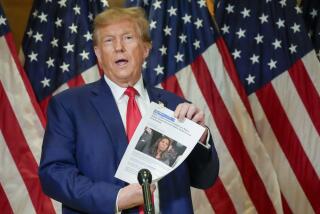Defense Fund Is Set Up to Help Pay Clintons’ Legal Bills : Presidency: Aides say the call for donations is distasteful but necessary. Lawyers’ charges could ring up as much as $2 million a year.
- Share via
WASHINGTON — President Clinton, in what aides called a distasteful but necessary move, has established a defense fund to pay his mounting legal bills, which advisers said could be as high as $2 million a year until the cases against him are resolved.
The fund marks an unwelcome first for a sitting President and illustrates the heavy toll that the Paula Corbin Jones sexual harassment complaint and the Whitewater controversy are taking on the Clinton presidency and the Clintons personally.
White House Counsel Lloyd N. Cutler said that the President’s and the First Lady’s legal bills will dwarf their income while in office, and the legal proceedings against them could drag on for years.
The Clintons reported income of $293,000 and a net worth of about $1.6 million on their 1993 tax returns.
Cutler noted that special counsel Robert B. Fiske Jr., who is investigating the Clintons’ involvement in the Whitewater Development Corp. and related matters, “clearly has a long way to go” before concluding his inquiry.
Cutler also noted that if Clinton is unsuccessful in getting the Jones sexual harassment suit dismissed on grounds of presidential immunity, “we could have hundreds” of other lawsuits against Clinton based on his actions before taking office.
“It (the fund-raising effort) doesn’t really lend dignity to the Oval Office,” said Charles Lewis, director of the Center for Public Integrity, a campaign finance watchdog group. “They’re doing a tin cup for Bill and Hillary, and any way you cut it, it’s unprecedented and it’s not pretty.”
Former President Richard Nixon accepted donations to help cover his legal bills after he left office, but he paid the bulk of his legal fees himself. No other President or ex-President has felt compelled to seek public donations to pay his lawyers.
Washington lawyer Michael H. Cardozo, who will serve as an unpaid trustee for the fund, said that he and the fund’s other trustees had not yet decided how to generate donations, which will be limited to $1,000 per individual.
Money will not be accepted from political action committees, corporations, lobbying groups, professional associations or labor unions, he said.
Clinton advisers defended the $1,000 figure as lower than the limits set by the House and Senate for legal defense funds, which are $5,000 and $10,000 respectively. It is also the same limit placed on individual contributions to campaigns for federal office.
But Lewis criticized the figure as too high. “There aren’t that many just plain folks out there in Oklahoma or Montana who can pony up $1,000,” Lewis said. “We all know who’s going to give that kind of money--and most of them live inside the (Washington) Beltway.”
The names of donors will be reported to the Clintons every three months, and the names and amounts of contributions will be disclosed publicly at least twice a year.
Cardozo said that there would be no unseemly Clinton Defense Fund dinners or rock concerts. But the trustees of the fund would explore such fund-raising methods as direct mail, telephone solicitation, print advertisements and even televised appeals.
Cardozo said that he would try to avoid demeaning the Clintons or the presidency in his money-raising efforts.
Appeals for donations would be “dignified and appropriate,” said Cardozo, who served as deputy White House counsel in the Jimmy Carter Administration. “At all times we will act with probity and respect for the office of President.”
The fund, formally known as the Presidential Legal Expense Trust Fund, is structured as a grantor trust, which will protect the Clintons from having to pay gift taxes.
Contributions to the defense fund are not tax deductible, according to M. Bernard Aidinoff of Sullivan & Cromwell, who drew up the trust instrument and will serve as its legal counsel.
The investment income from the trust is taxable to President and Mrs. Clinton, but the taxes will be paid from the trust itself, according to the document, which was released Tuesday by Cutler, Cardozo and Aidinoff.
The trust will expire when all legal actions against the Clintons are resolved and any excess funds will be donated to charity or turned over to the federal Treasury. The Clintons have indicated that they will not take a federal tax deduction for any such donation.
Cardozo, Cutler and the Clintons put together a list of eminent Americans to serve as trustees for the fund, although their role will be limited.
The fund will be chaired by the Rev. Theodore M. Hesburgh, president emeritus of Notre Dame University, and former Atty. Gen. Nicholas deB. Katzenbach.
In a statement, Hesburgh and Katzenbach said: “No previous President has had to face the enormous personal legal expenses confronting President Clinton, because of current legal proceedings based on events that allegedly occurred well before he took office. These expenses will be many times his total compensation as President.”
Whatever the merits of the suits, they said, it is in the public interest to help Clinton meet “a financial burden that could otherwise distract him from performing his public responsibilities.”
The other trustees are John Brademas, former Indiana congressman and president emeritus of New York University; Barbara Jordan, former Texas congresswoman; Ronald L. Olson, Los Angeles lawyer; Elliot L. Richardson, former attorney general, secretary of defense and secretary of health, education and welfare; Michael Sovern, president emeritus of Columbia University, and John C. Whitehead, former deputy secretary of state.
More to Read
Get the L.A. Times Politics newsletter
Deeply reported insights into legislation, politics and policy from Sacramento, Washington and beyond. In your inbox three times per week.
You may occasionally receive promotional content from the Los Angeles Times.










